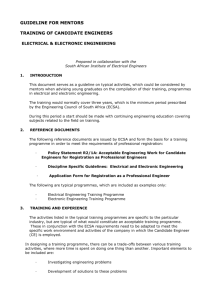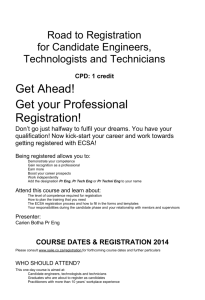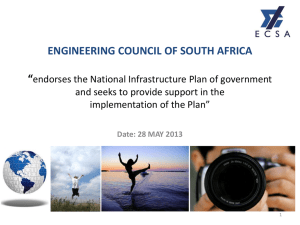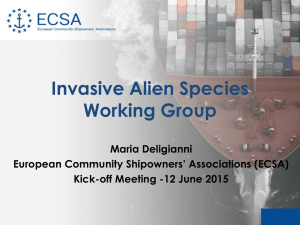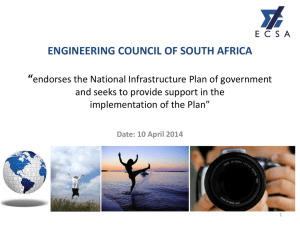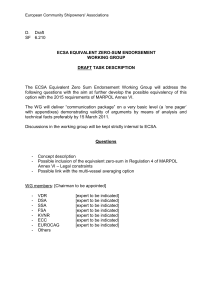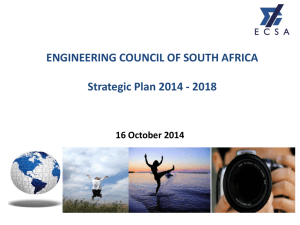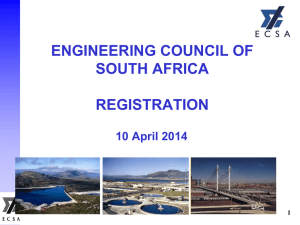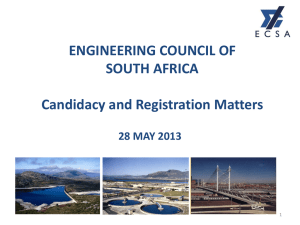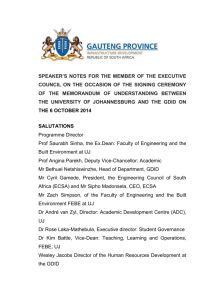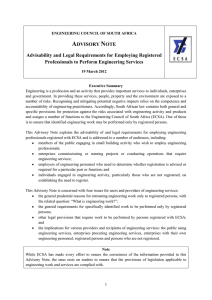ECSA Brochure
advertisement
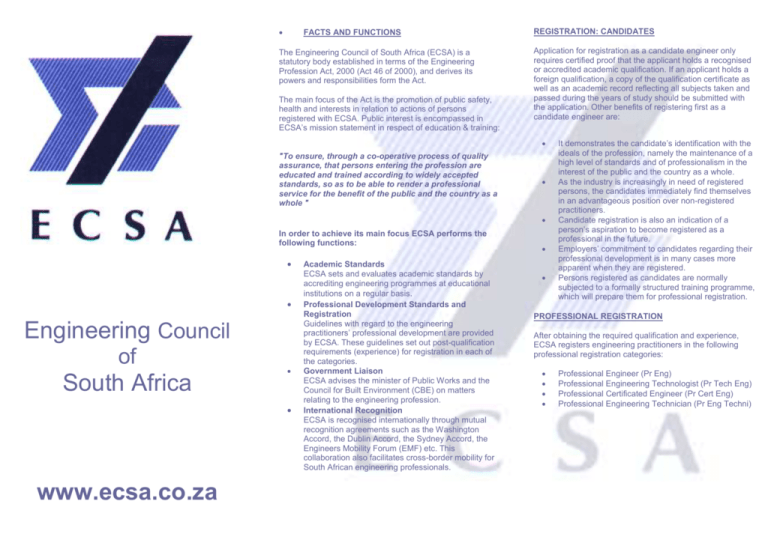
FACTS AND FUNCTIONS The Engineering Council of South Africa (ECSA) is a statutory body established in terms of the Engineering Profession Act, 2000 (Act 46 of 2000), and derives its powers and responsibilities form the Act. The main focus of the Act is the promotion of public safety, health and interests in relation to actions of persons registered with ECSA. Public interest is encompassed in ECSA’s mission statement in respect of education & training: REGISTRATION: CANDIDATES Application for registration as a candidate engineer only requires certified proof that the applicant holds a recognised or accredited academic qualification. If an applicant holds a foreign qualification, a copy of the qualification certificate as well as an academic record reflecting all subjects taken and passed during the years of study should be submitted with the application. Other benefits of registering first as a candidate engineer are: "To ensure, through a co-operative process of quality assurance, that persons entering the profession are educated and trained according to widely accepted standards, so as to be able to render a professional service for the benefit of the public and the country as a whole " In order to achieve its main focus ECSA performs the following functions: Engineering Council of South Africa www.ecsa.co.za Academic Standards ECSA sets and evaluates academic standards by accrediting engineering programmes at educational institutions on a regular basis. Professional Development Standards and Registration Guidelines with regard to the engineering practitioners’ professional development are provided by ECSA. These guidelines set out post-qualification requirements (experience) for registration in each of the categories. Government Liaison ECSA advises the minister of Public Works and the Council for Built Environment (CBE) on matters relating to the engineering profession. International Recognition ECSA is recognised internationally through mutual recognition agreements such as the Washington Accord, the Dublin Accord, the Sydney Accord, the Engineers Mobility Forum (EMF) etc. This collaboration also facilitates cross-border mobility for South African engineering professionals. It demonstrates the candidate’s identification with the ideals of the profession, namely the maintenance of a high level of standards and of professionalism in the interest of the public and the country as a whole. As the industry is increasingly in need of registered persons, the candidates immediately find themselves in an advantageous position over non-registered practitioners. Candidate registration is also an indication of a person’s aspiration to become registered as a professional in the future. Employers’ commitment to candidates regarding their professional development is in many cases more apparent when they are registered. Persons registered as candidates are normally subjected to a formally structured training programme, which will prepare them for professional registration. PROFESSIONAL REGISTRATION After obtaining the required qualification and experience, ECSA registers engineering practitioners in the following professional registration categories: Professional Engineer (Pr Eng) Professional Engineering Technologist (Pr Tech Eng) Professional Certificated Engineer (Pr Cert Eng) Professional Engineering Technician (Pr Eng Techni) In each of these categories, provision is made for candidate registration. The academic and experience requirements for professional registration are as follows: Pre-Requisite Most local authorities and state departments require registration when using consultants. COMPULSORY REGISTRATION CATEGORY ACADEMIC QUALIFICATION MINIMUM EXPRIENCE Professional Engineer BSc(Eng)/ B Eng (4yrs) Professional Engineering Technologist BTech (Eng) 3 years Professional Certificated Engineer Government Certificate of Competency for Engineers, Mine Managers, Marine, Electrical and Mechanical Engineers 3 years in responsible position - 1 year must be as the engineer appointed in terms of an applicable Act NDip 3 years Professional Engineering Technician 3 years WHY DO YOU NEED TO REGISTER Besides that you will be seen as a “professional” practitioner with your own title, registration will also indicate that you subscribe to the setting of high-level standards and the enforced maintenance thereof. Registration is also beneficial for the following reasons: Professional Status The registered title behind your name means a great deal. It confers recognition that you belong to a profession with high ideals of professionalism and selfregulation. Marketability and Financial Gain The industry is increasingly requiring that only registered persons be employed for certain positions. Registration enhances your marketability in the employment market and the possibility of appointment in responsible engineering positions. Many employers also pay registered persons higher salaries. Trust and Recognition of Qualifications and Experience Private and public sectors show greater trust in your performance because you are bound by legal requirements and a Code of Professional Conduct. Professional Competence There is greater confidence in your professional competence since admission is based on peer evaluation of both academic qualifications and engineering experience. Registration is a statutory requirement if you: Perform consulting engineering work Take responsibility for the performance of engineering work Perform functions as laid down in certain statutes (e.g. the National building Regulations) Wish to become a full member of some recognised institutes. WHAT NOW? Prepare yourself now for your professional career. After obtaining your qualification, apply for registration as a candidate and acquire the necessary professional skills in a structured way during that period. ECSA has developed guidelines appropriate for each discipline of engineering, which will help you and your future employer in achieving the competencies necessary for registration. It is of critical importance to select employers who have committed themselves to the training and professional development of their engineering staff in accordance with ECSA’s requirements. In addition to your public responsibility, which is bestowed upon you through registration with ECSA, you should, as an engineering professional, assume responsibility for enhancing your professionalism throughout your career. You should become a member of at least one appropriate institute, institution, society or association in the engineering profession. Avoidance of all possible conflict of interest. Consciousness that the profession of engineering is often judged by the performance of the individual. Professionalism for the Engineering Practitioner means: Striving to improve all work, using the most up-to-date techniques and procedures, until it becomes a model for those in the field. Proper credit for work done and ideas developed by subordinates. Loyalty to one’s employer and clients, always with concern to public safety in construction, product design, plant operation and all other phases of engineering. Leadership of less experienced colleagues and subordinates toward personal development and enthusiasm for the profession. Activity in professional and technical societies, thereby demonstrating an interest in the profession. Registration with ECSA as demonstration to coworkers and the public that you adhere to the one important hallmark of a professional person - a willingness to go beyond the minimum to improve standards and protect public health, safety and interests. LIFESTYLE BENEFITS ECSA has negotiated special deals with various service providers to meet the specific needs of persons registered with ECSA. Your registration must be active and up to date in order to qualify for these benefits. For more details visit the Lifestyles Benefits section on ECSA’s Website: www.ecsa.co.za READY TO REGISTER? These bodies promote their members’ interests and assist them in improving their technological knowledge and skills, as well as providing lifestyle benefits. You should become actively involved in these bodies and thereby contribute to the betterment of the image and status of the profession. Application forms are available from the ECSA offices, on our website www.ecsa.co.za or per request via e-mail, engineer@ecsa.co.za. Should you need any further assistance regarding Registration, please forward your query to registration@ecsa.co.za. PROFESSIONALISM For any other information contact: For the engineering practitioner, professionalism implies that maximum use will be made of skills and knowledge, and that each person will use their competence to the fullest with: Honesty and integrity Their best effort in spite of the fact that frequently, neither the client nor the employer is able to evaluate the effort. The Manager: Corporate Communications e-mail: engineer@ecsa.co.za Engineering Council of South Africa Private Bag X691 BRUMA, 2026 Tel: (011) 607 9500 · Fax: (011) 622 9295
